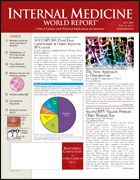Exenatide plus TZD Beneficial, but Study Design Questioned
Weight-Loss Benefits Undisputed
By Rebekah McCallister
Ann Intern Med
A new study supporting the addition of exenatide (Byetta) to thiazolidinedione (TZD) therapy in patients with poorly controlled type 2 diabetes demonstrated that this combination—with or without metformin (Glucophage)—resulted in improved glycemic control, reductions in hemoglobin (Hb) A1c, and weight loss compared with placebo (. 2007;146:477-485).
Despite these positive findings, Saul Malozowski, MD, PhD, argues in an accompanying editorial (pages 527528) that this study may raise more questions than it answers.
The 16-week study included 233 patients (aged 21-75 years; 55% men) who were suboptimally controlled with a TZD—either rosiglitazone (Avandia) ≥4 mg/day, or pioglitazone (Actos) ≥30 mg/day—with or without metformin. They were randomized to add-on therapy with exenatide 10 ?g (n = 121) or placebo (n = 112) twice daily. At baseline, both groups were similar in age, body weight, duration of disease, and glycemic control. A total of 86 patients in the exenatide group and 96 patients in the placebo group completed the study.
The primary end point was change from baseline in HbA1c. Secondary outcomes were changes in fasting serum glucose level, body weight, and self-monitored blood glucose level.
P
P
HbA1c levels decreased by a mean of 0.89% in those receiving exenatide ( < .001) but increased by a mean of 0.09% in the placebo group—a difference of nearly 1 percentage point. Likewise, mean fasting serum glucose level decreased more in those receiving exenatide than placebo, with a between-group mean difference of -1.69 mmol/L ( <.001).
At the end of the study, self-monitored blood glucose levels in those taking exenatide were lower at all measurements throughout the day compared with baseline, but this difference was not significant when compared with the placebo group.
Notably, patients taking exenatide lost a mean of 1.5 kg of body weight, while placebo recipients maintained their baseline weight.
Nausea was the most common adverse event and led to 26% (16) of patients in the exenatide group and 2% in the placebo group to discontinue treatment.
These results at first glance appear promising, but careful consideration of the study design is necessary, warns Dr Malozowski, of the National Institute of Diabetes and Digestive and Kidney Diseases, Bethesda, Md. Drawbacks include the study's small size, short duration, lack of consideration of lifestyle interventions, and an atypical population that was not being adequately treated with conventional therapy, he notes.
Physicians who are looking to improve results in their poorly controlled patients with type 2 diabetes should keep in mind that this study does not tell us "whether patients optimally treated with diabetes education, diet, TZDs, and metformin will receive as much benefit from exenatide as the paper reports," Dr Malozowski writes.
He notes that this study serves as a reminder of the power drug manufacturers can wield by controlling the flow of information about a product. (All of the study investigators had a connection with the drugs' manufacturers).
